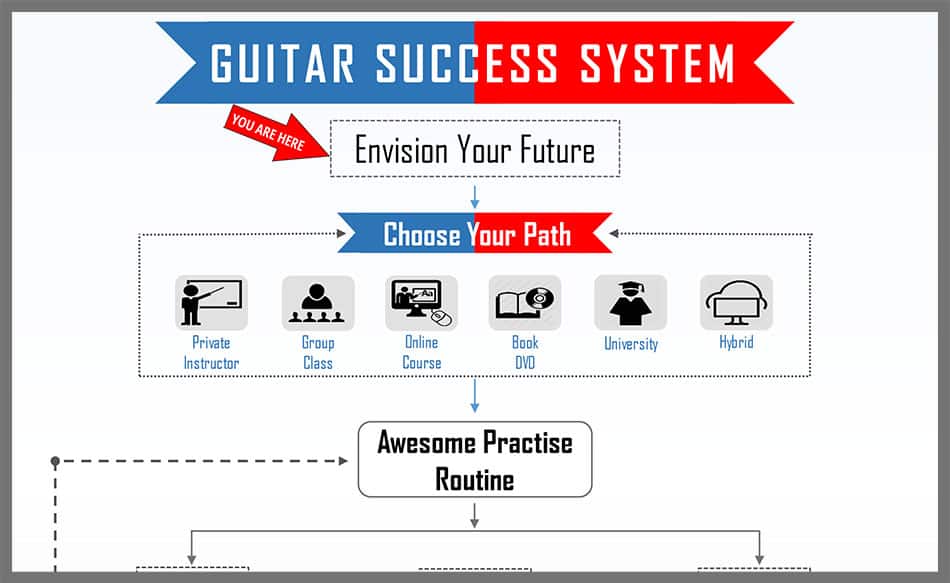
The First Step To Guitar Playing Success – Getting Clear
This is the 1st in a series of posts. In this series I'm going to reveal a powerful system that at its foundation can help you realize any skill you want to have in your life. But in this series we’re gonna focus on learning to play beautiful guitar… Which, just so happens, is a passion of mine 🙂
Step #1 – Envision Your Future
When I was growing up playing guitar looked mysterious to me.
Now I can see it’s really pretty simple.
You basically repeat “guitar playing actions” until your mind and your body agree to do it the way you imagine inside your head.
And the good news is you were born with the ability to do this. In fact it’s pretty natural.
Your mind and body are constantly recording the way you do things and trying to automate it. That is what goes on when learning any skill.
The process goes roughly something like this.
- You envision a specific action.
- Your body carries out the action to the best of its ability, trying to match the one in your mind.
- You assess how close it was.
- Then you make adjustments (hopefully) and repeat.
As the action are repeated the subconscious mind automates the process to save mental processing energy.
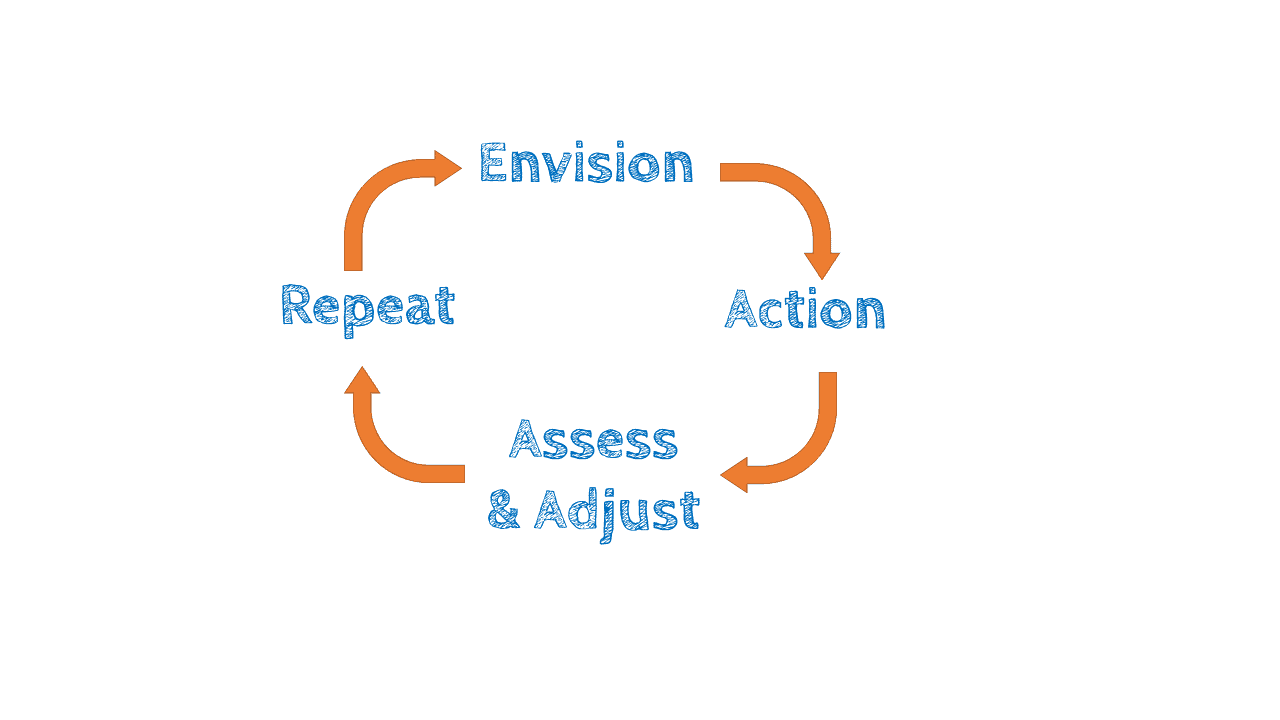
It Starts In Your Mind
Everyone who wants to play guitar has some idea what it should sounds like.
But most people’s idea is pretty fuzzy. This makes it difficult from the beginning to know what actions to take and whether or not you’re getting closer as you progress.
In fact I believe that many people who quit, particularly in the early stages, do so because they don’t have a clear idea I’m what they’re aiming for.
Here’s how you can create a powerful vision that will support you tremendously through the journey to playing beautiful guitar.
Creating Your Guitar Playing Future
Make some time in your schedule. Plan to give your full attention to this process for at least 30 minutes, preferably for an hour or more the first time you do it. Find a place where you can be reasonably relaxed and undisturbed.
Get out your favorite writing pen and notebook… or your laptop. I do a lot of writing on my computer, but when I’m writing something inspirational I still prefer pen and paper.
Now begin to answer the following questions. There really is no right or wrong answer and you can change as time goes on. You just need a place to start from.
- What situations what I like to see myself playing?
- Would I enjoy playing by myself in my room?
- Would I like to play in front of others?… Family and friends? More people… cafes, bars, parties, concerts, weddings?
- How about bringing my guitar on camping trips and doing group sing-alongs?
- Who are some of the guitar players I admire and would like to model?
- Do I want to play popular songs?
- Would I like to create my own songs?
- Does playing with others seem like something I’d like to do?
- How about being part of a band?
- What else would I like to do with my music? Play in church? Uplift aging folks in convalescent homes? Have family sing-alongs with my children? Teach music?
- How do I feel when I’m playing guitar the way I envision and in the situations I envision?
Don't worry about getting this perfect right now. It's a process. You'll come back to it and refine it many times.
What Is Your Inspiration?
Over time you’ll want to refine what you’ve written and get it down to a powerful sentence or two.
Remember it’s a process. It’s great if you can do this in the first sitting, but for many it takes many sittings over a period of time.
Also keep in mind that this is for your own inspiration and guidance. You’ll refer to this when you are feeling that you’re not getting anywhere or began wondering why you are spending time at learning guitar. And those times will come.
By way of example here is the sentence I ended up with after many months of refining and rewriting. This is my phrase and it works for me. Yours may be very different and still work perfectly for you. It probably will be.
Okay… here goes…
“I uplift millions of people all over the world by creating beautiful inspired music, and by empowering others to create their own beautiful music.”
Hmmm… I don’t think I’ve shared that with you, my students, before. I guess it’s about time.
Now… this sentence works for me because it brings to mind the reasons I want to play guitar… reasons I got clear on when I went through this process. If someone had just given me this sentence from the start it wouldn’t mean anything to me.
Your Mission If You Choose To Accept It…
… is to take the time to get clear on what inspires and motivates you. Then refine it to a form you can refer to regularly. Not only will this support you during difficulties but it will help you make decisions about what path to take to learn guitar and what to practice.
Get The Step #1 Cheat Sheet Here:
Recommended Resources:
Step #2 – Choose Your Path

… So many roads. Which one to choose? Well… That's an excellent question to be asking.
I knew very little when I first started about how to choose the best path to playing guitar. In fact, truth be told, I wasn't even really sure what “playing guitar” look like for me. But things have changed. And you are going to get the benefit of what I have learned so you don't have to reinvent the wheel.
“There are many paths up the mountain, but the view of the moon from the top is the same.”
~ Ancient Japanese Saying
To know which path to take the first thing to do is get a bird’s-eye view of what's available to you. Below I’ve created an outline of the most common ways to go about learning guitar along with the pros and cons of each. I tried to include only a summary of the most important information I believe would be useful for you. Otherwise this could easily turn into an entire book.
Let's get started…
Private Instructor
- PROS
- It can be very inspiring to spend time with an encouraging and supportive instructor that is very good at both playing and teaching guitar.
- An instructor can identify potential bad habits and help correct them as they come up. This can save a lot of time and frustration.
- ACCOUNTABILITY: Having a set time to see your instructor means you are more likely to practice. You don’t want to disappoint the instructor, but also it’s encouraging when someone acknowledges your progress.
- There’s a confidence that you’re practicing the right thing if your instructor gives clear assignments that build on previous lessons.
- CONS
- It can be difficult to find a good instructor. Poor instructors can be unorganized and discouraging.
- Few standards are available to choose a good instructor, especially for a beginner. Anyone can call themselves a guitar instructor regardless of their previous experience or education on how to teach guitar. Being able to play guitar, even play well, does not make one a good instructor. Often beginning students do not have the criteria to know a good instructor from someone who is incompetent.
- Private instruction usually cost more than group instruction or online lessons, and the best instructors are often more expensive.
- Good instructors may have limited availability (one of my best instructors has a 3 month waiting list… with no guarantee of getting in).
- TIME: Travel time and scheduling issues can make a 30 minute private lesson actually take 2 hours or more. It may seem like a deal to have an instructor come to your home, but there really is no free ride. If the instructor has to do the traveling you either pay more or the instructor gets less money for their time. Since better instructors can charge more money something has to give.
- Depending on the instructor and how well they document the lesson it can be difficult to remember what and how to practice. Frustrating when you’re paying a lot of money.
- Because the private instructor is paid for each lesson there is a built-in handicap… instructors hesitate to challenge the student to practice more or to stretch beyond their current abilities for fear of losing a student, and hence their paycheck. This can be minimized with programs where there’s more commitment on the student’s part.

Online Courses
- PROS
- Often more affordable than private (with some exceptions).
- There’s a real convenience of being able to access lessons whenever you have computer access.
- Ability to review lesson several times.
- It’s possible to have access to very high quality instruction and learning systems at a lower price because many people share the same lesson.
- You can practice along with videos and compare your playing to the online version. Done properly this is a good way to improve timing and technique.
- CONS:
- Limited or no accountability. No one but you knows if you’re practicing. Depending on your level of discipline you may be more likely to procrastinate and practice less.
- No feedback to help you correct bad habits as they come up.
- Lack of customized guidance. You may not know how long to spend on a specific lesson or how to get over a difficult area.
- No one to acknowledge you for doing a good job (practicing and progressing).
Books/Dvd's
- PROS:
- Affordable and often an incredible value for the money.
- Can be used in conjunction with private lessons or online lessons.
- Can be used over and over as well as shared with others.
- You can learn in your own home and don't even need a computer.
- CONS:
- When used by themselves they do not provide any feedback or correction. You can't even get questions answered like you can online.
- Books have the limitation of not showing movements very clearly.
- Books and DVDs cannot be added to or updated like online lessons.
- Learning by yourself through books or DVDs does not provide any form of external accountability.

University Or Music School
- PROS:
- The quality of education is often high because the instructors have standards they have to fulfill.
- Can provide a combination of private lessons and group classes.
- Being a part of a program helps with motivation and accountability.
- It's likely you'll get a well rounded music education that includes theory, performance and practical technique.
- Many schools can attract high quality instructors because of their reputation and pay rate.
- Because you're part of a program an instructor can sometimes push harder and get more out of the students because they're not being paid by the lesson or by the student.
- Can obtain a degree or certificate.
- CONS
- Cost a lot of money.
- Many public Colleges and Universities are limited in terms of styles supported. They usually focus on classical and possibly jazz… Not likely to encourage pop, rock and world music.
- There’s a tendency to overemphasize thinking about music instead of creating and performing music from the heart.
- Because the professors entire world can be centered around the University sometimes they develop a narrow focus. This can lead to a lack of practical application and more emphasis on the theoretical as well as a disconnect from popular music.
- Lack of flexibility. To obtain a degree you would likely have to take courses that may not be as useful depending on your goals.
- Did I mention it’s expensive… 🙂 Many students will have to go into debt to finish a four year program.
Group Class
- PROS:
- Group classes can be a lot of fun because of the camaraderie of other students. You may be willing to show up more often to learn with other people.
- Because there is one instructor for many students it is often a lower cost per student than private lessons.
- It can be less intimidating to be in a crowd than to have the instructor looking at everything you do for the entire lesson.
- Playing along with others can help develop timing and rhythm.
- CONS:
- Less flexibility with schedule then private lessons or learning online.
- What can be less intimidating on one hand can also make it so you are is less likely to practice. Your lack of practice can be hidden by other students. You’re also less likely to get acknowledgment when you do practice and make progress as you would in a private lesson.
- It's very difficult for one teacher to actually correct the mistakes and accommodate the needs of many students at once.
- Usually the class is comprised of students at different levels. Even if they start off at the same place there will be some students that practice more and some that practice less. You can easily find yourself in a situation where you’re not challenged because the class is being held back for the slower students, or you're struggling because you didn't practice as much.
- Because of the different levels of students and lack of accountability it's more likely that your progress will be slow. I often meet students at my music school that took a group class and feel very dissatisfied with their progress.
- Most instructors believe teaching guitar in a class is inefficient. That makes it difficult to find a really good instructor teaching a group class.
Hybrid Solution
A hybrid approach can often minimize the disadvantages of a single approach while taking advantage of the benefits of both.
The University often uses group classes for theory and performance while providing private instruction for students to work on their specific instrument. Often private instructors will take advantage of good books and use them in their lessons. Some even are beginning to use DVDs so students can follow along with something at home in between lessons.

One-On-One Lessons Videos
One hybrid option that I think has tremendous potential is combining private lessons, either in person or through Skype, with an online program. The private portion of the lessons would provide the accountability that's missing from an online program with no interaction. In addition the instructor could catch mistakes and help the student develop proper technique through individual guidance.
The online program would provide videos and written materials that could be used day or night to practice along with and even teach new information. I find it very useful to have short videos to give students to practice along with instead of relying on them to just remember what was said during a private lesson.
Even more importantly a systematic well thought out online program could provide the structure which is often missing with private instructors. If the student is trying to complete an online course along with the individual instruction there is a built-in motivation to keep moving forward and not get distracted.
Finally it could be more cost effective. Because a portion of the instruction is being delivered through pre-recorded videos and written documents it leaves the instructor free to spend more time on guiding the student to develop correct habits, to practice effectively, and to set realistic goals be held accountable for them. Individual lessons will have more impact and can be shorter or spread out farther apart.
So Which Is The Best Path For You?
The best path for you will depend for the most part on your goals. That's why it's so important to start with the Envision process. It will give you clarity to help you choose the best path for you. You’re also more likely to stay motivated on the path you’ve chosen.
For example, if you want to become a music teacher it’s likely you will choose to go the University path to get the advantage of a multifaceted music education along with the credentials. On the other hand if you want to play for family and friends that wouldn't serve you so well. It would be a little like going around the block 10 times just to get across the street, and paying a lot of money for the privilege.
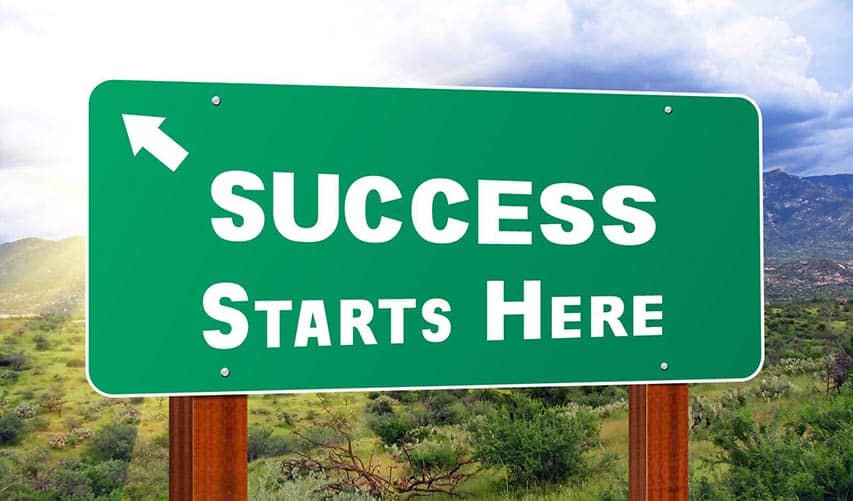
There is no one right way for everybody and there is no perfect path. However, all said and done, its best to make your best choice and take action. Once you've completed the Envision process choose a path and set up the next step in the process… Practicing. Once you start practicing and learning you'll have more information to make more choices.
Here's a list of some possible goals with suggestions of the most effective paths to achieving them. Because goals are unique to every individual there is no way to list every goal. Hopefully this can provide enough variety for you to get an idea of which path or paths would be right for you.
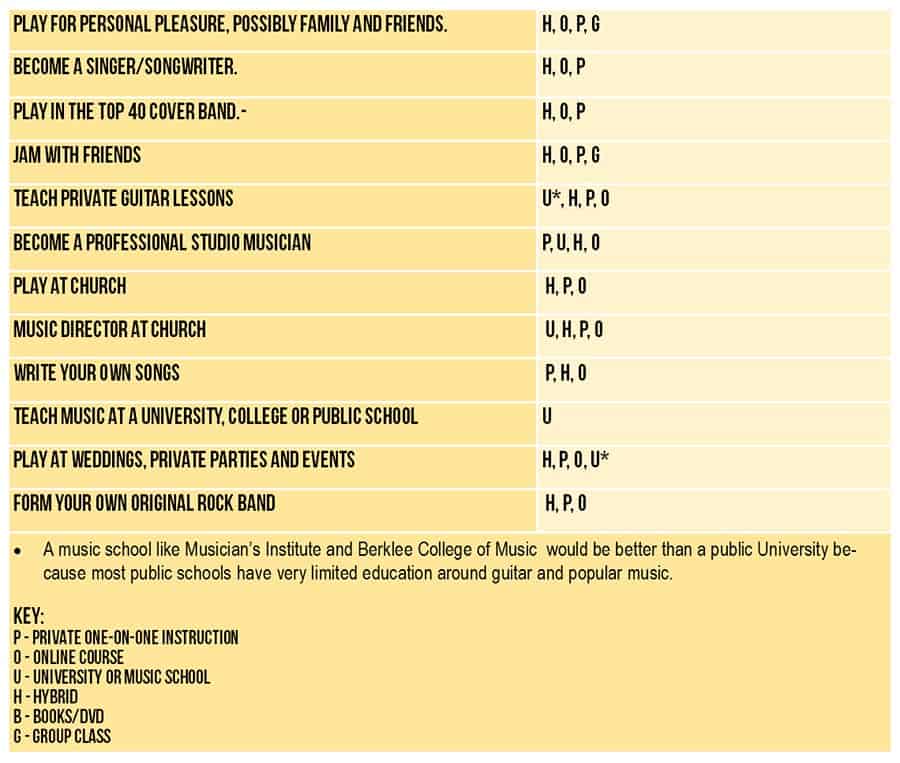

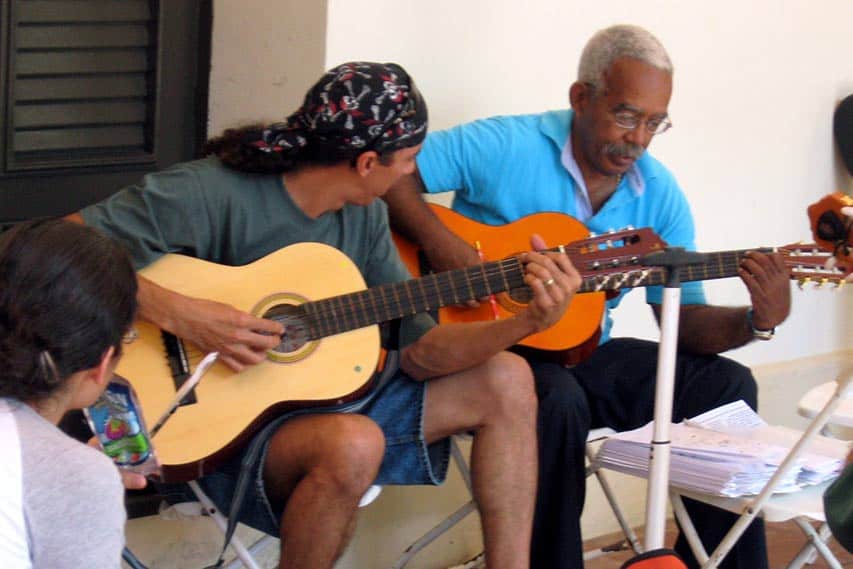
By a guitar or buy a guitar?
Got it… thanks John.
Tomas
I am taking private 30 minute lessons (one/week) also a member of your “guitar success” program, also have a 4 disc DVD on learning to Play Guitar by Colin McAllister. Of the 3 approaches I like the private lessons best because of the interaction and to be able to advance as slowly as need be. Your and the other program is very good but often too fast and advanced for me. It’s often like I missed something. But when I try to find what I missed I can not find it.